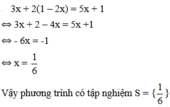Giải phương trình: |2x^2-5x+1|=|3x-1|
NM
Những câu hỏi liên quan
giải các phương trình sau:
a.|2-5x|=|2x-3|
b.|2-5x|-2|x+1|=3x+5
c.|3x-1|+2|x-1|=|5x-3|
a: =>|5x-2|=|2x-3|
=>5x-2=2x-3 hoặc 5x-2=-2x+3
=>3x=-1 hoặc 7x=5
=>x=5/7 hoặc x=-1/3
b: =>|5x-2|-|2x+2|=3x+5
TH1 x<-1
PT sẽ là 2-5x+2x+2=3x+5
=>-3x+4=3x+5
=>-6x=1
=>x=-1/6(loại)
TH2: -1<=x<2/5
Pt sẽ là 2-5x-2x-2=3x+5
=>-7x=3x+5
=>-4x=5
=>x=-5/4(loại)
Th3: x>=2/5
PT sẽ là 5x-2-2x-2=3x+5
=>3x-4=3x+5
=>0x=9(loại)
Đúng 0
Bình luận (0)
Giải phương trình sau bằng cách đưa về phương trình tích: (2x + 1)(3x – 2) = (5x – 8)(2x + 1)
(2x + 1)(3x – 2) = (5x – 8)(2x + 1)
⇔ (2x + 1)(3x – 2) – (5x – 8)(2x + 1) = 0
⇔ (2x + 1).[(3x – 2) – (5x – 8)] = 0
⇔ (2x + 1).(3x – 2 – 5x + 8) = 0
⇔ (2x + 1)(6 – 2x) = 0
⇔ 2x + 1 = 0 hoặc 6 – 2x = 0
+ 2x + 1 = 0 ⇔ 2x = -1 ⇔ x = -1/2.
+ 6 – 2x = 0 ⇔ 6 = 2x ⇔ x = 3.
Vậy phương trình có tập nghiệm 
Đúng 0
Bình luận (0)
giải phương trình: 3x+2(1-2x)=5x+1
\(3x+2\left(1-2x\right)=5x+1\\ \Leftrightarrow3x+2-4x-5x-1=0\\ \Leftrightarrow-6x+1=0\\ \Leftrightarrow-6x=-1\\ \Leftrightarrow x=\dfrac{1}{6}\)
Vậy pt có tập nghiệm \(S=\left\{\dfrac{1}{6}\right\}\)
Đúng 0
Bình luận (0)
\(3x+2\left(1-2x\right)=5x+1\)
\(\Leftrightarrow3x+2-4x=5x+1\)
\(\Leftrightarrow-x-5x=-2+1\)
\(\Leftrightarrow-4x=-1\)
\(\Leftrightarrow x=\dfrac{1}{4}\)
Đúng 0
Bình luận (0)
Giải các phương trình sau bằng cách đưa về phương trình tích
a) 2x(x-5)+4(x-5)=0
b) 3x-15=2x(x-5)
c) (2x+1)(3x-2)=(5x-8)(2x+1)
d) (4x^2-1+(2x+1)(3x-5)
\(a,2x\left(x-5\right)+4\left(x-5\right)=0\\ \Leftrightarrow\left(x-5\right)\left(2x+4\right)=0\\ \Leftrightarrow\left[{}\begin{matrix}x-5=0\\2x+4=0\end{matrix}\right.\\ \Leftrightarrow\left[{}\begin{matrix}x=5\\2x=-4\end{matrix}\right.\\ \Leftrightarrow\left[{}\begin{matrix}x=5\\x=-2\end{matrix}\right.\)
Vậy \(x\in\left\{5;-2\right\}\)
\(b,3x-15=2x\left(x-5\right)\\ \Leftrightarrow3\left(x-5\right)-2x\left(x-5\right)=0\\ \Leftrightarrow\left(x-5\right)\left(-2x+3\right)=0\\ \Leftrightarrow\left[{}\begin{matrix}x-5=0\\-2x+3=0\end{matrix}\right.\\ \Leftrightarrow\left[{}\begin{matrix}x=5\\2x=3\end{matrix}\right.\\ \Leftrightarrow\left[{}\begin{matrix}x=5\\x=\dfrac{3}{2}\end{matrix}\right.\)
Vậy \(x\in\left\{5;\dfrac{3}{2}\right\}\)
\(c,\left(2x+1\right)\left(3x-2\right)=\left(5x-8\right)\left(2x+1\right)\\ \Leftrightarrow\left(2x+1\right)\left(3x-2\right)-\left(5x-8\right)\left(2x+1\right)=0\\ \Leftrightarrow\left(2x+1\right)\left(3x-2-5x+8\right)=0\\ \Leftrightarrow\left(2x+1\right)\left(-2x+6\right)=0\\ \Leftrightarrow\left[{}\begin{matrix}2x+1=0\\-2x+6=0\end{matrix}\right.\\ \Leftrightarrow\left[{}\begin{matrix}2x=-1\\2x=6\end{matrix}\right.\\ \Leftrightarrow\left[{}\begin{matrix}x=-\dfrac{1}{2}\\x=3\end{matrix}\right.\)
Vậy \(x\in\left\{-\dfrac{1}{2};3\right\}\)
Câu d xem lại đề
Đúng 2
Bình luận (1)
Giải các phương trình sau: 3x +2(1-2x)= 5x+1
giải phương trình sau:
(2x^2-3x+1)(2x^2+5x+1)= 9x^2
Giải phương trình và bất phương trình sau:
a
)
|
3
x
|
x
+
6
b
)
x
+
2
x
-
2
-
1
x
2
x...
Đọc tiếp
Giải phương trình và bất phương trình sau:
a ) | 3 x | = x + 6 b ) x + 2 x - 2 - 1 x = 2 x x - 2 c ) ( x + 1 ) ( 2 x – 2 ) – 3 > – 5 x – ( 2 x + 1 ) ( 3 – x )
a) |3x| = x + 6 (1)
Ta có 3x = 3x khi x ≥ 0 và 3x = -3x khi x < 0
Vậy để giải phương trình (1) ta quy về giải hai phương trình sau:
+ ) Phương trình 3x = x + 6 với điều kiện x ≥ 0
Ta có: 3x = x + 6 ⇔ 2x = 6 ⇔ x = 3 (TMĐK)
Do đó x = 3 là nghiệm của phương trình (1).
+ ) Phương trình -3x = x + 6 với điều kiện x < 0
Ta có -3x = x + 6 ⇔ -4x + 6 ⇔ x = -3/2 (TMĐK)
Do đó x = -3/2 là nghiệm của phương trình (1).
Vậy tập nghiệm của phương trình đã cho S = {3; -3/2}

ĐKXĐ: x ≠ 0, x ≠ 2
Quy đồng mẫu hai vễ của phương trình, ta được:

![]()
![]()
![]()

![]()
Vậy tập nghiệm của phương trình là S = {-1}
c) (x + 1)(2x – 2) – 3 > –5x – (2x + 1)(3 – x)
⇔ 2x2 – 2x + 2x – 2 – 3 > –5x – (6x – 2x2 + 3 – x)
⇔ 2x2 – 5 ≥ –5x – 6x + 2x2 – 3 + x
⇔ 10x ≥ 2 ⇔ x ≥ 1/5
Tập nghiệm: S = {x | x ≥ 1/5}
Đúng 0
Bình luận (0)
Giải phương trình:
\(\dfrac{2x}{3x^2-x+2}\) - \(\dfrac{7x}{3x^2+5x+2}\) = 1
`(2x)/(3x^2-x+2)-(7x)/(3x^2+5x+2)=1(x ne -1,-2/3)`
Đặt `a=3x^2+2x+2(a>=5/3)`
`pt<=>(2x)/(a-3x)-(7x)/(a+3x)=1`
`=>2x(a+3x)-7x(a-3x)=a^2-9x^2`
`<=>2ax+6x^2-7ax+21x^2=a^2-9x^2`
`<=>-5ax+27x^2=a^2-9x^2`
`<=>a^2-36x^2+5ax=0`
`<=>a^2-4ax+9ax-36x^2=0`
`<=>a(a-4x)+9x(a-4x)=0`
`<=>(a-4x)(a+9x)=0`
`+)a=4x`
`=>3x^2+2x+2=4x`
`=>3x^2-2x+2=0`
`=>x^2-2/3x+2/3=0`
`=>(x-1/3)^2+5/9=0` vô lý
`+)a+9x=0`
`=>3x^2+2x+2+9x=0`
`=>3x^2+11x+2=0`
`=>x^2+11/3x+2/3=0`
`=>x=(-11+-\sqrt{97})/6`
Đúng 1
Bình luận (0)
ĐKXĐ: \(x\ne-1;x\ne-\dfrac{2}{3}\)
Ta có: \(\dfrac{2x}{3x^2-x+2}-\dfrac{7x}{3x^2+5x+2}=1\)(1)
\(\Leftrightarrow\dfrac{2}{3x-1+\dfrac{2}{x}}-\dfrac{7}{3x+5+\dfrac{2}{x}}=1\)
Đặt: \(3x+\dfrac{2}{x}=a\) (x khác 0) thì pt(1) trở thành:
\(\dfrac{2}{a-1}-\dfrac{7}{a+5}=1\)
\(\Leftrightarrow\dfrac{2\left(a+5\right)-7\left(a-1\right)}{\left(a-1\right)\left(a+5\right)}=1\)
\(\Leftrightarrow2\left(a+5\right)-7\left(a-1\right)=\left(a-1\right)\left(a+5\right)\)
\(\Leftrightarrow-5a+17=a^2+4a-5\)
\(\Leftrightarrow a^2+4a+5-5-17=0\)
\(\Leftrightarrow a^2+9a-22=0\)
\(\Leftrightarrow\left(a-2\right)\left(a+11\right)=0\)
\(\Leftrightarrow\left[{}\begin{matrix}a=2\\a=-11\end{matrix}\right.\Leftrightarrow\left[{}\begin{matrix}3x+\dfrac{2}{x}=2\\3x+\dfrac{2}{x}=-11\end{matrix}\right.\)
Vì \(\left\{{}\begin{matrix}3x^2+2-2x\ne0\\3x^2+11x+2\ne0\end{matrix}\right.\)
=> PT vô nghiệm
Ủa hình như sai:vvv
Đúng 0
Bình luận (1)
giải phương trình
(2x^2-3x+1)(2x^2+5x+1)=9x^2
Thấy x=0 ko là nghiệm chia 2 vế cho x2 ta dc
\(\left(\frac{2x^2-3x+1}{x}\right)\left(\frac{2x^2+5x+1}{x}\right)=9\)
\(\Leftrightarrow\left(2x-3+\frac{1}{x}\right)\left(2x+5+\frac{1}{x}\right)=9\)
Đặt \(t=2x+\frac{1}{x}\) ta có:
\(\left(t-3\right)\left(t+5\right)=9\Rightarrow t^2+2t-15-9=0\)
\(\Rightarrow t^2+2t-24=0\Rightarrow\left(t-4\right)\left(t+6\right)=0\)
\(\Rightarrow\orbr{\begin{cases}t=4\Rightarrow2x+\frac{1}{x}=4\\t=-6\Rightarrow2x+\frac{1}{x}=-6\end{cases}}\)
\(\Rightarrow\orbr{\begin{cases}\frac{2x^2-4x+1}{x}=0\\\frac{2x^2+6x+1}{x}=0\end{cases}}\Rightarrow\orbr{\begin{cases}2x^2-4x+1=0\\2x^2+6x+1=0\end{cases}}\)
\(\orbr{\begin{cases}\Delta=\left(-4\right)^2-4\left(2\cdot1\right)=8\\\Delta=6^2-4\left(2\cdot1\right)=28\end{cases}}\)\(\Rightarrow\orbr{\begin{cases}x_{1,2}=\frac{4\pm\sqrt{8}}{4}\\x_{3,4}=\frac{-6\pm\sqrt{28}}{4}\end{cases}}\)
Đúng 0
Bình luận (0)






